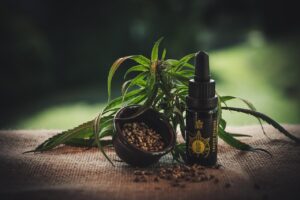For many people, headaches are more than just an inconvenience. Not only are they painful, but they can also be debilitating. The pain can be so intense that doing anything is impossible.
Headache disorders are, unfortunately, common. However, only a minority of people suffering from them get diagnosed. These disorders include migraines, tension-type headaches, and cluster headaches.
Over-the-counter (OTC) medications are the most common treatment for headaches, but not everyone wants to use OTC medicines. Instead, they’re looking for something more natural. If you’re looking at ways to manage your headaches, here’s what you need to know about OTC medicine vs. natural remedies, including medical marijuana.
OTC Medicine vs. Natural Remedies: What Are They?
OTC medicines are those that you buy at your local pharmacy. You can pick them up off the shelf and purchase them without a prescription. They typically come in tablet or gel cap form — though some come in liquid form — and they’re considered safe for use so long as you take them as directed by the label or your doctor.
Natural remedies offer an alternative to conventional OTC medications. Also called herbal remedies, these medicines come directly from plants, which are the basis of traditional medicine.
The most significant difference between OTC medicine vs. natural remedies is that OTC medications are FDA-approved. They meet the FDA’s regulations for safety, efficacy, and quality. On the other hand, many herbal remedies fall under the “herbal supplement” or “food” category. As such, they aren’t subject to the same testing, labeling, and manufacturing standards. Labels often say that any statements about herbal remedies and their efficacy haven’t been evaluated by the FDA.
Common OTC Medicines for Headaches
Several OTC medicines on the market can help alleviate headaches. Some of the most common include:
- Aspirin (Bayer)
- Acetaminophen (Tylenol)
- Ibuprofen (Advil, Motrin)
- Naproxen (Aleve)
These medications can offer effective relief from headache pain. However, they’re also known to have potential side effects. For instance, aspirin can cause heartburn and gastrointestinal issues. Ibuprofen and naproxen can cause gastrointestinal upset, nausea, vomiting, and liver damage. Some of these medicines also have a risk of allergic reaction.
While the FDA labels these medications as safe and effective, and the risks of side effects are generally low, some people look for alternatives. That’s where natural remedies come in.
Natural Headache Remedies
There are many natural ways to relieve headaches. Their effectiveness hasn’t been evaluated by the FDA, but anecdotal evidence shows that they may work.
Drink More Water
For some, chronic dehydration can lead to headaches. It can also trigger irritability and affect concentration, which can make symptoms worse. Drinking more water may help headaches subside faster.
Sleep
Too little sleep each night can lead to more frequent and severe headaches. Some research also shows that sleeping too much can also increase your risk. Aiming to get adequate restful sleep may help.
Cold Compresses
A cold compress on the head or neck can help reduce inflammation and constrict blood vessels. It may also slow nerve conduction. These factors together may help ease headache pain.
Essential Oils
Some essential oils may help alleviate headaches. Some of the more well-known ones include peppermint and lavender. There are a few things to keep in mind if you decide to try them. For one, essential oils are highly concentrated liquids that can cause skin irritation. Using a carrier oil may help avoid that issue. Additionally, you generally don’t want to ingest them.
Vitamins and Minerals
Some evidence suggests that a magnesium deficiency can lead to more frequent headaches. It also shows that adding a magnesium supplement may help reduce headache frequency and severity. However, these supplements may have side effects — such as diarrhea — so exercise caution. You may want to start with a small dose or speak with your doctor.
Some B vitamins may also help reduce your risk of headaches — namely B2, B6, and B12. Adding a B vitamin complex supplement could be helpful.
Herbal Supplements
People use a variety of herbal remedies to treat headaches, including:
- Willow
- Ginger
- Valerian
- Rosemary
- Yarrow
- Feverfew
- Butterbur
Many of these herbal remedies help to reduce inflammation, which can aid in reducing headaches. While many of them are generally safe in recommended dosages, others may have potential side effects. For instance, unpurified butterbur can cause liver damage. Research also shows mixed results on their effectiveness.
Medical Marijuana
Medical marijuana has gained a lot of attention in recent years as a potential treatment for a wide range of ailments, including pain. Many people are using cannabis for pain and headaches. While research is still limited, some studies are finding that prolonged use may help reduce headache frequency without the unwanted side effects of OTC medicines.
The problem with marijuana and headaches is that while states are gradually legalizing cannabis for medical use, it’s still illegal on the federal level. As such, it’s not as easy to obtain as other natural remedies. However, many states list migraines as a qualifying condition for a medical marijuana card. Speak with your doctor if you’re interested in giving cannabis a try.
Marijuana and Headaches: Tips for Use
If you plan to use medical marijuana for headaches, here are a few tips to keep in mind.
Choose the Right Strain
With so many different strains on the market, you might not know where to start. Some strains may work better than others for headaches, such as:
- Tikun Olam Avidekel
- GMO Cookies
- Pakistani Chitral Kush
- Gelato #33
- Tikun Olam Midnight
- Tikun Olam Alaska
Consider Your Delivery Method
If you’re looking for instant relief, you’ll want a product that offers fast results. Smoking and vaping kick in the quickest, taking effect in a matter of minutes.
Topicals may help with some headaches — such as tension headaches — but more research is needed. The benefit of topicals like creams and balms is that they won’t get you high.
Start Low
When you’re first getting started with cannabis, switching to a new strain, or trying a new product, start with a low dose. Gradually work your way up until you find what works best for you.
Find Cannabis Products for Your Headaches at VidaCann
If you’re looking for alternatives to conventional OTC medicines for your headaches, medical marijuana could be an option. Speak with your physician about cannabis for pain and headaches to get started.
Are you ready to start looking for cannabis products to alleviate your headache pain? VidaCann offers a wide variety of the highest quality flowers, vapes, edibles, topicals, and more. Check out our selection online or visit your nearest Florida dispensary today.








